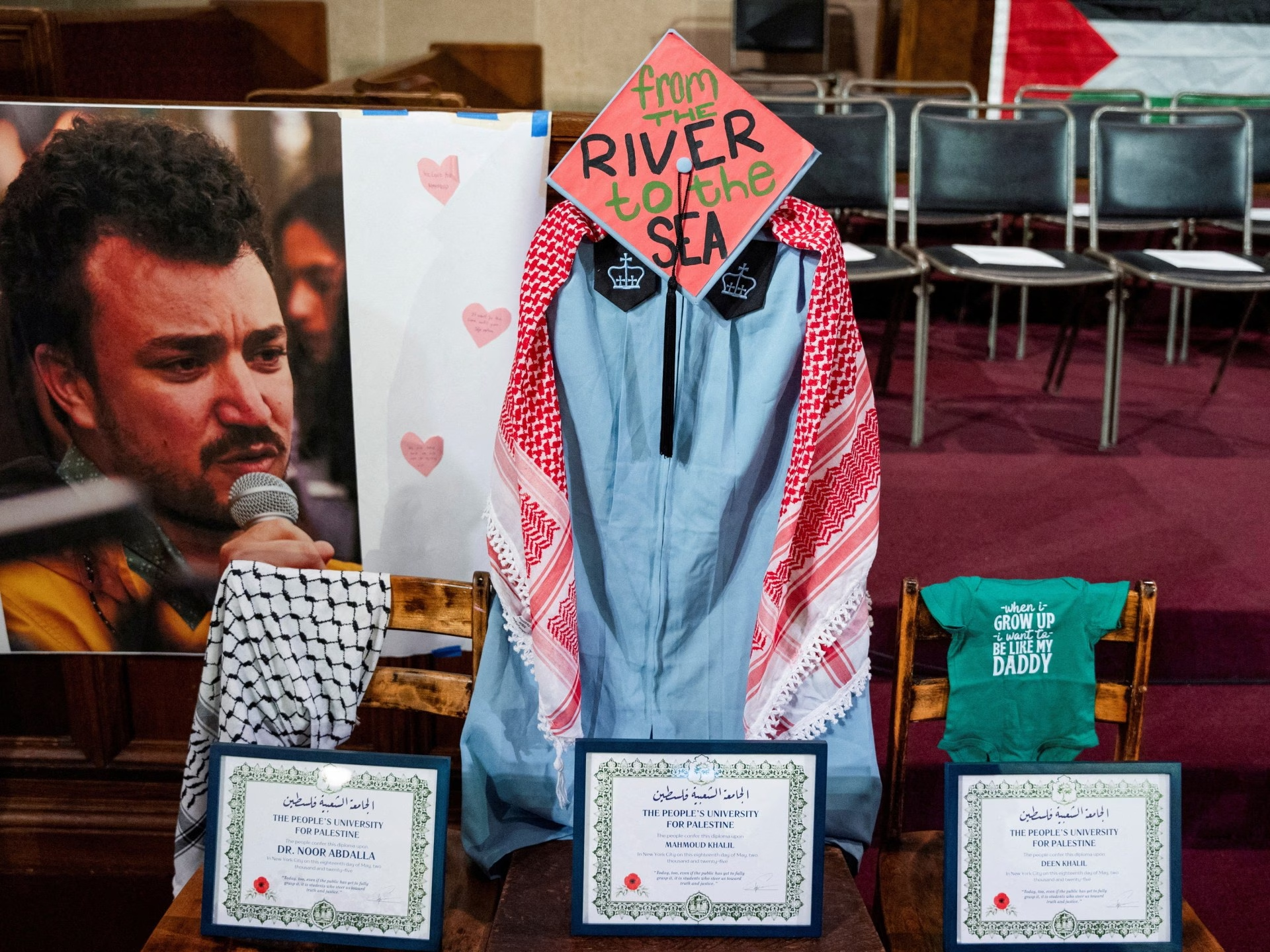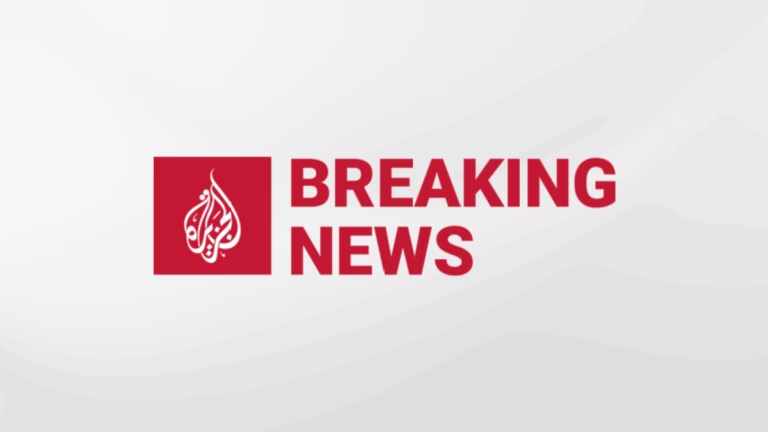The Trump administration has argued that Khalil, a Columbia University student, did not disclose past affiliations.
A federal judge in the United States has ruled that Mahmoud Khalil, a student protester, can remain in custody due to allegations of immigration fraud under the Trump administration.
On Friday, Judge Michael Farbiarz of Newark, New Jersey, did not find sufficient grounds from Khalil’s legal team to prove that his detention based on the charge was unlawful.
This is a significant setback for Khalil, who had been acting as a negotiator for the student protesters at Columbia University who were demonstrating against Israel’s actions in Gaza. He was the first prominent protester to be arrested under President Trump’s policy to expel international students participating in pro-Palestinian demonstrations.
Just this week, Judge Farbiarz was inclined to order Khalil’s release, arguing that his detention under the Immigration and Nationality Act of 1952 was unconstitutional.
This Act gives the secretary of state, Marco Rubio in this case, the authority to remove foreign nationals who may have “potentially serious adverse foreign policy consequences for the United States”. However, Judge Farbiarz ruled that using this law in Khalil’s case violated his freedom of speech rights.
Despite this, the Trump administration submitted further documents in court, claiming another reason for wanting to deport Khalil.
They alleged that Khalil, a permanent US resident, omitted information from his green-card application that would have prevented him from obtaining residency.
The Trump administration has long accused Khalil of supporting terrorism through his activities in protest, a claim he strongly denies.
Regarding his green-card application, it is argued that Khalil did not disclose his work with the United Nations Relief and Works Agency for Palestine Refugees in the Near East (UNRWA), a humanitarian organization. Certain politicians in Israel and the US have accused UNRWA of ties to Hamas, although these allegations have been made without evidence.
Khalil’s legal team denies that he was an “officer” in UNRWA, clarifying that he completed a United Nations internship through Columbia University.
The administration also argues that Khalil inaccurately reported the duration of his employment with the Syria Office of the British Embassy in Beirut. Khalil and his legal team assert that he accurately stated his departure date from the job as December 2022.
Judge Farbiarz had set a Friday deadline for the Trump administration to appeal Khalil’s release on bail, but this was extended to allow more time for the government to challenge his release.
Ultimately, the judge allowed the Trump administration to continue detaining Khalil, advising his lawyers to seek release on bail in the immigration court in Louisiana where his deportation trial is occurring.
Farbiarz was considering a separate habeas corpus petition from Khalil’s team that questioned the constitutionality of his ongoing detention.
Marc Van Der Hout, Khalil’s lawyer, told Reuters that charging immigration fraud is extremely rare, suggesting that the Trump administration’s use of such charges was a political tactic to keep him detained.
“Detaining someone on such a charge is unusually rare and frankly outrageous,” said Van Der Hout. “There still is no constitutional basis for his detention.”
Another lawyer for Khalil, Amy Greer, regarded the new allegations against his green-card application as part of the government’s “cruel, transparent delay tactics”. She highlighted that Khalil, who became a new father in April, would miss his child’s first Father’s Day on Sunday in the US.
“Instead of celebrating together, he is detained by ICE [Immigration and Customs Enforcement] as punishment for advocating for his fellow Palestinians,” said Greer. “It is unfair, it is shocking, and it is disgraceful.”
On Friday, Judge Michael Farbiarz of Newark, New Jersey, did not find sufficient grounds from Khalil’s legal team to prove that his detention based on the charge was unlawful.
This is a significant setback for Khalil, who had been acting as a negotiator for the student protesters at Columbia University who were demonstrating against Israel’s actions in Gaza. He was the first prominent protester to be arrested under President Trump’s policy to expel international students participating in pro-Palestinian demonstrations.
Just this week, Judge Farbiarz was inclined to order Khalil’s release, arguing that his detention under the Immigration and Nationality Act of 1952 was unconstitutional.
This Act gives the secretary of state, Marco Rubio in this case, the authority to remove foreign nationals who may have “potentially serious adverse foreign policy consequences for the United States”. However, Judge Farbiarz ruled that using this law in Khalil’s case violated his freedom of speech rights.
Despite this, the Trump administration submitted further documents in court, claiming another reason for wanting to deport Khalil.
They alleged that Khalil, a permanent US resident, omitted information from his green-card application that would have prevented him from obtaining residency.
The Trump administration has long accused Khalil of supporting terrorism through his activities in protest, a claim he strongly denies.
Regarding his green-card application, it is argued that Khalil did not disclose his work with the United Nations Relief and Works Agency for Palestine Refugees in the Near East (UNRWA), a humanitarian organization. Certain politicians in Israel and the US have accused UNRWA of ties to Hamas, although these allegations have been made without evidence.
Khalil’s legal team denies that he was an “officer” in UNRWA, clarifying that he completed a United Nations internship through Columbia University.
The administration also argues that Khalil inaccurately reported the duration of his employment with the Syria Office of the British Embassy in Beirut. Khalil and his legal team assert that he accurately stated his departure date from the job as December 2022.
Judge Farbiarz had set a Friday deadline for the Trump administration to appeal Khalil’s release on bail, but this was extended to allow more time for the government to challenge his release.
Ultimately, the judge allowed the Trump administration to continue detaining Khalil, advising his lawyers to seek release on bail in the immigration court in Louisiana where his deportation trial is occurring.
Farbiarz was considering a separate habeas corpus petition from Khalil’s team that questioned the constitutionality of his ongoing detention.
Marc Van Der Hout, Khalil’s lawyer, told Reuters that charging immigration fraud is extremely rare, suggesting that the Trump administration’s use of such charges was a political tactic to keep him detained.
“Detaining someone on such a charge is unusually rare and frankly outrageous,” said Van Der Hout. “There still is no constitutional basis for his detention.”
Another lawyer for Khalil, Amy Greer, regarded the new allegations against his green-card application as part of the government’s “cruel, transparent delay tactics”. She highlighted that Khalil, who became a new father in April, would miss his child’s first Father’s Day on Sunday in the US.
“Instead of celebrating together, he is detained by ICE [Immigration and Customs Enforcement] as punishment for advocating for his fellow Palestinians,” said Greer. “It is unfair, it is shocking, and it is disgraceful.”







